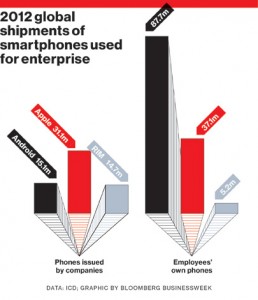Last summer, Samsung Electronics agreed to customize a version of their popular Galaxy S II smartphone for a health care start-up company that needed a device that would transmit heart monitor information directly to doctors. Since then, it seems that Samsung has officially decided to “play” in the enterprise solutions market. In fact, a Samsung spokesperson noted that Samsung has “made the decision to be No. 1 in enterprise.”
It seems to be a fairly bold statement, seeing as Apple and RIMM have dominated the enterprise market in the recent years. In fact, Apple was said to have recently passed RIMM (Blackberry) as the leading provider of company-issued smartphones and could maintain that position through 2016. (BusinessWeek). The overwhelming majority of large companies are testing iPhones and iPads for employee use.
On the surface it would appear that the barrier to entry in this market is very difficult, if not almost futile. How could Samsung possibly think there’s an opportunity here? The answer is customization. Apple has a history of cutting edge products, but ultimately doesn’t customize ANY of them. What you see is what you get, and for most, this is quality product that needs no customization. However, Samsung sees an open door. So many companies are now looking for enterprise solutions that will best fit their structure, and Samsung feels it can meet these demands better than Apple or RIMM. By being open to customization as well as working with third party vendors to target specific industry’s needs, Samsung plans to fight to become #1 in enterprise solutions. The company is taking a good hard look at competitors like HTC and even Google, and notice that neither seems to be interested in the enterprise space. The business strategy seems to be to attack a market segment that has not yet been saturated.
Of course, to play in this segment, Samsung must be prepared for the new challenges it will bring. For example, an advantage of Android is that it’s highly customizable. However, it can be a disadvantage for the same reason, making it difficult to standardize security and management software to sell across multiple corporations due to so many different versions of Android currently available. To address this challenge, Samsung has already invested in designing its own software for this purpose which will make all Samsung devices operate consistently.
Samsung will have other challenges to consider as well. For example, the company will need to be sure to market to corporations accordingly to re-brand itself as an enterprise solution provider. Also, it will need to continue to offer a sustainable competitive advantage over time. Finally, resources will need to be reallocated or added to support corporations’ customer service requirements as well as to meet their customization needs.
How do you think Samsung will perform in the enterprise market? What would you say your biggest concern would be if you were the CEO of Samsung?
Samsung and Apple Duel in Enterprise Tech
http://www.businessweek.com/articles/2012-12-13/samsung-and-apple-duel-in-enterprise-tech#p1
